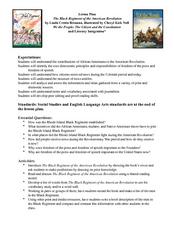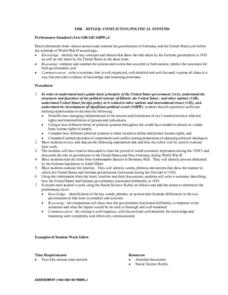Pacific University Oregon
Civil Rights: US History
To gain an understanding of the Civil Rights Movement of the 1960s, class members investigate the Jim Crow Laws, the Emancipation Proclamation, the 13th, 14th, and 15th Amendments of the US Constitution, and the 1898 Supreme Court case,...
Constitutional Rights Foundation
The Troubled Elections of 1796 and 1800
Congress does more than create new laws. Political scientists delve into the elections of 1796 and 1800 to understand how political parties, the Electoral College, and personal agendas affected the election process. The resource also...
New York State Education Department
US History and Government Examination: June 2011
Those who lived during the Great Depression could clearly draw a line between the roaring 1920s and the desolation of the following decade. Class members examine these two periods and compare them using an essay question prompt and...
Curated OER
We the People: The Citizen and the Constitution: The American Revolution
The contributions of African-Americans to the American Revolution are the focus of this Social Studies and language arts lesson plan. After reading and discussing Linda Crotta Brennan’s The Black Regiment of the American Revolution,...
National Constitution Center
The Development and Application of the First Amendment
What are the limits on freedom of speech? While a cherished right in the Constitution, it is not unbridled. Budding historians consider what checks should exist on this liberty using news stories, court cases, and College Board prompts.
Judicial Learning Center
Judicial Independence: What’s Wrong with This Court?
Why is it important for judges to operate independently of politics or other branches of government? Scholars ponder the question as they examine video clips, case studies, excerpts of the US Constitution, and an interactive computer...
Judicial Learning Center
Separation of Powers/Qualifications of Office
Time to work together in class to understand the separation of powers as well as the qualifications for office! The resource includes terms to review for pre-knowledge before beginning instruction. Following the review, pupils work on a...
Constitutional Rights Foundation
The Census in US History
The census has been a part of the American landscape since the Constitution was written; however, it does have a history of controversy. Class members use a guided reading and simulation activity on developing census questions to...
Judicial Learning Center
Article III WebQuest
Why is Article III of the constitution so significant? Pupils discover the importance of Article III and how it relates to past as well as current events by completing Internet research using a provided handout. They learn everything...
Museum of the American Revolution
Hamilton Was Here: Rising Up in Revolutionary Philadelphia
Hamilton may be a hit Broadway show, but there is so much more to learn. An eight-unit resource guides young historians through the life of Alexander Hamilton and the Revolutionary War. The lessons include hands-on-activities, writing,...
Curated OER
Do We Need a New Constitutional Convention
Pupils analyze the adaptive nature of the U.S. Constiution. In this Amendments lesson, students listen to their instructor present a lecture regarding the amendment process. Pupils respond to question regarding the...
Curated OER
Should the United States Have a Central Bank?
Students assess the validity of a national bank. They study the importance of McCullough v. Maryland. They review the arguments of Hamilton and Jefferson. They analyze the Tenth Amendment and the debate over state v. federal power. They ...
Curated OER
Obama Hope Poster
Young scholars consider constitutional rights. In this Bill of Rights lesson, students complete an activity guide regarding the property rights regarding the Obama "Hope" poster. Young scholars respond to discussion questions pertaining...
Curated OER
Participating in State and Local Government
Students analyze the structure, organization, and powers of State legislatures. They outline the overall shape of the office of the governor.
Students analyze the structure of local governments as creations of the State. They describe...
Curated OER
Introduction to Farming in the United States
Students discuss basic foods and what constitutes a well-balanced meal. They identify four basic food groups, and identify food sources, such as farms.
Curated OER
Why Does Congress Work That Way?
Students discover the powers of Congress. In this legislative branch lesson, students examine the legislative process as they analyze Article I of the U.S. Constitution. Students consider the powers of Congress as they define the role of...
Curated OER
Building a Human Rights Document
Students identify the issue of basic human rights, examine the importance of the UDHR, and compare it to United States Bill of Rights. They create a definition of human rights as a class. Students are divided into groups of four and...
Curated OER
Taking A Stand - Rules and Laws
Young scholars explore the purpose of rules and laws in society, as well as some of the basic tenets of the Constitution that address equal rights for all citizens. Next, they examine historical examples of segregation and consider its...
Curated OER
Legislative Branch
Learners analyze Article 1 of the Constitution. They respond to the Public Criticism E-Learning module.
Curated OER
What Is the Bill of Rights?
Students discuss the purpose of the Bill of Rights and the United States Constitution. In groups, they write about the ten amendments and their purpose. They re-word the Amendments in their own way and answer discussion questions to end...
Curated OER
FDR-Hitler: Conflicting Political Systems
Students compare and contrast the governments of the United States and Germany during World War II. Using different media, they identify the actions of both countries during the war and their major mistakes. They write a short summary...
University of Arkansas
Assessment and Discussion
"Without concerned citizen action to uphold them (human rights) close to home; we shall look in vain for progress in the larger world. . ." Eleanor Roosevelt's comment is used to set the stage for the conclusion of a five-lesson unit...
Curated OER
The First (and Last) Words
What does "freedom of speech" mean to your class, especially in the context of Internet communications? In round-table discussion format, middle and high schoolers address the issues discussed in "State Legislatures Across U.S. Plan to...
Curated OER
What Makes a Good Law?
Why were laws created? Spark a group discussion on why we need laws to co-exist. Should the sale of some things be outlawed on Sundays? Read a case summary between Target and the state of Minnesota that debated this issue. Ask your...
Other popular searches
- United States Constitution
- United Statesusus Constitution
- The United States Constitution
- Unites States Constitution























